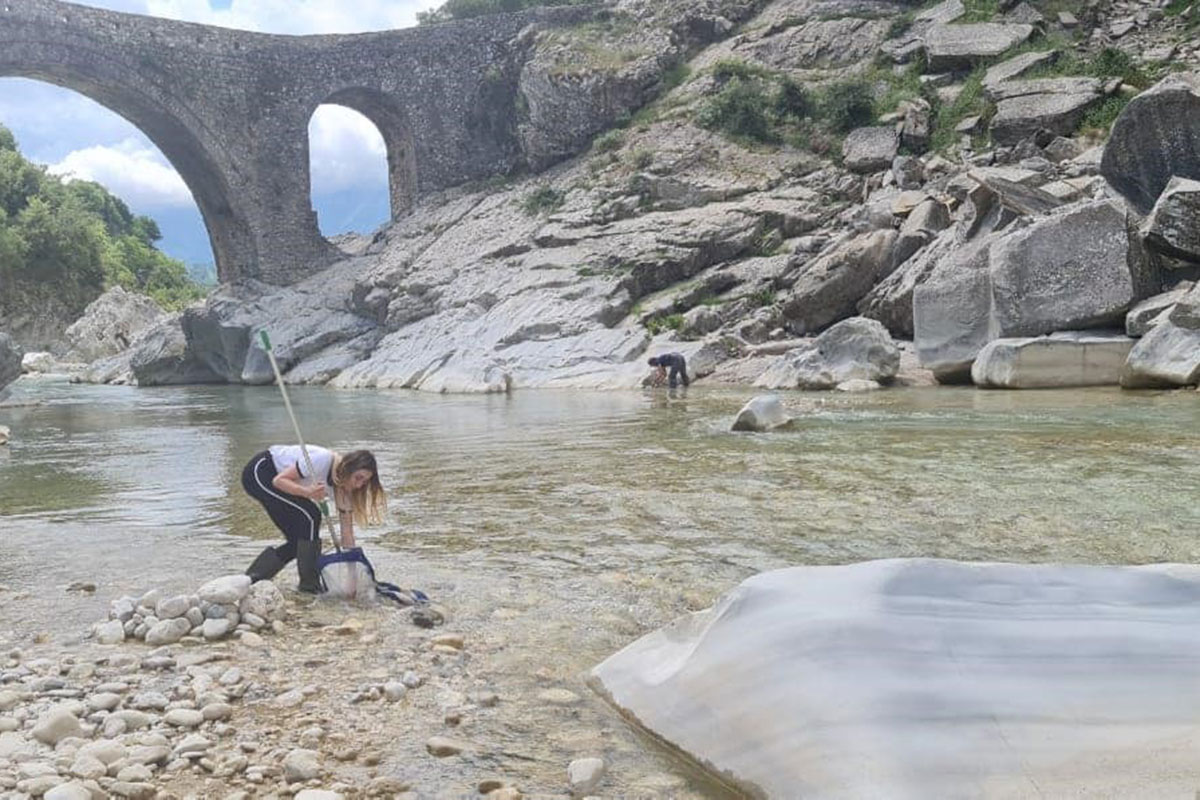Over the last six months, an Austrian company, STRABAG, has been laying pipes to divert water from Shushica to the Albanian Riviera to meet the demands of tourism. However, this project will leave local residents without water for their personal needs, including at home and for farming.
On Saturday, 27 May, a group of local residents of the Shushica River valley, along with activists and citizens from Vlora and the Vjosa area, deposited a large water pipe outside the office of Prime Minister Edi Rama. The large, blue pipe was inscribed with 1,500 signatures of people opposing a proposed water abstraction project that will impact the Shushica River, a tributary of the Vjosa River, now protected following a global campaign to establish it as a national park.
Over the last six months, an Austrian company, STRABAG, has been laying pipes to divert water from Shushica to the Albanian Riviera to meet the demands of tourism- an industry currently booming in the country. With some 10 million visitors expected this year and new luxury resorts and complexes springing up along the coast seemingly every day, there is not enough water to go around.
However, this German Development Bank and EU-funded project to divert water from Shushica will leave local residents without water for their personal needs, including at home and for farming.
 Source: exit.al
Source: exit.al
“The construction on site must stop immediately. This project will destroy a whole valley by leaving the people, livestock, and land without water. We will not allow this to happen. We are determined to stop the construction if we are not heard today. We are not against water for Himara, but we are a national park region, and we can’t let this happen to our Shushica,” says Lela Qejvani, a local activist.
Lela’s concerns were echoed by local Mayor Astrit Balilaj, who notes that the Shushica River is supposed to be protected by law.
“We came to Tirana to show our determination. We don´t want this project to be implemented. Our village and all the others will be affected by the diversion of the Lepusha source. Shushica is part of the national park and should be protected.”
The water diversion project is set to impact several thousand people in 37 villages, including Kuc, Brataj, Kote, Peshkëpi, Tërbaç, Vranisht, Kallarat, Mesaplik, Lepenicë, Gjorm, Selenicë, and more.
Not only is the river a lifeline for residents, but the Shushica is also a very rich biodiversity hotspot.
“If this project proceeds, the Shushica—or at least large parts of it—will have to lose its national park status. This would be a significant loss for nature and the local communities, who would miss out on the benefits of national park tourism. Ultimately, this is also a choice between ecotourism and succumbing to mass tourism.” says Ulrich Eichelmann from the NGO Riverwatch.
Europe’s last wild river
The Shushica and its springs are a key tributary of the Vjosa, Europe's last big wild river outside of Russia. Along its 270 kilometres, it flows without obstruction until it reaches the Adriatic Sea. In 2023, following a ten-year campaign by activists and local and international organisations, the Albanian government proclaimed it a National Park- the highest level of protection possible, meaning it and its tributaries would be protected from development.
A visit of European scientists to the Shushica River in 2021 to assess the area's flora and fauna yielded plentiful results. Back then, local biologist Betilda told me that the water under the iconic Ottoman Brataj Bridge is full of Plecoptera, an organism that thrives in pure, clean water- something that is increasingly rare in Europe’s rivers.
“If you destroy its branches, the Vjosa will also be destroyed, just like the trunk of a tree that eventually dies if you cut off all its branches,” Professor Fritz Schiemer from the University of Vienna told me in 2021.
While most of the plans for small hydropower projects on this part of the river have been shelved, the water diversion will essentially risk the river bed running dry.
Snakes, lizards, salamanders, countless types of fish, birds, and various mammals can all be found here, flourishing and living in harmony with the river, and you can see the way the water fertilizes the land around it as flourishing vegetation fans up and around the valley.
Just a few meters past the bridge, the river opens into various braided channels. The scientists who accompanied me assured me that this is something very special.
“Any similar sites in Europe were destroyed long ago, this is the only one left. It would be terrible if we were to allow it to be disturbed. It’s incredibly important that we understand its full value and protect it as best as we can,” Schiemer added.
Annette Spangenberg from the NGO EuroNatur agrees, "The Vjosa River was declared a National Park not only to protect the main river but also to safeguard a vibrant and intact river ecosystem, of which the Shushica is a crucial component. Water abstraction from the Shushica will pose a significant threat to the ecological integrity of the Vjosa Wild River National Park."
Booming tourism
Some 50 kilometers away in Himare, hotels and guesthouses are gearing up for the summer season.
Once a sleepy southern village, home to a Greek minority and a sprinkling of old stone houses and empty, half-built villas, Himara is now positioning itself as a leading luxury destination in Europe. A night in a hotel or a luxury villa can cost you upwards of EUR 300 per night during the peak summer months, with prices of meals and cocktails in line with those in Mykonnos or the Amalfi Coast.
2023 was Albania’s best year on record for tourism, but infrastructure groaned to keep up with demand. In addition, traffic jams, bumped-up prices that pushed locals out, and hiccups when adapting to the customer service standards of Western Europe kept cropping up on social media and review sites.
With millions more expected this year and more Albanian business owners seeking to capitalize on the country's popularity, more and more guest houses, hotels, and other forms of accommodation are springing up. All of these will need water for cleaning, cooking, showers, and, of course, luxury swimming pools.
Much of Albania struggles with round-the-clock water supplies during the rest of the year, let alone when significant numbers of tourists are in-country. A fact sheet by NGO Balkan Rivers notes that Durres, Vlora, Himara, and Saranda, all along the coast, are facing significant challenges regarding water supply.
As a result, the Albanian government has launched an initiative called Water 24/7 to provide drinkable water to all municipalities, at least within urban areas, 24/7 by 2025. This includes the 80,000 residents and tourists in Himara, where the project to divert the water officially started in January 2023.
‘Everything will be fine’
Local residents say they were not formally informed of the project, nor were they asked about it during the planning phase when consultations are supposed to take place. Others say the Environmental Impact Assessment was not accurate or representative of reality.
The Albanian Development Fund, a government agency carrying out the works, told BIRN that the project will have no significant environmental impact and that the lives of those in local communities will be “better thereafter.”
But this is not enough to reassure local activists. Olsi Nika from EcoAlbania said many other water sources could be tapped to solve the issue in Himara and that his organization and residents will not let the situation drop.
“This diversion project is not only destructive but also unnecessary. There are ample alternative water sources outside the national park’s boundaries to meet Himara's needs, should it be required. Alongside the residents of the Shushica, we are legally opposing the project in the Administrative Court.”.
The blog was created as part of the “Tales from the Region” initiative led by Res Publica and Institute of Communication Studies, in cooperation with partners from Montenegro (PCNEN), Kosovo (Sbunker), Serbia (Autonomija), Bosnia and Herzegovina (Analiziraj.ba), and Albania (Exit), within the project "Use of facts-based journalism to raise awareness of and counteract disinformation in the North Macedonia media space (Use Facts)" with the support of the British Embassy in Skopje.This edition of Tales from the Region is also done in partnership between ICS and the UPSURGE project, funded within the European Union’s Horizon 2020 under grant agreement No. 101003818.


